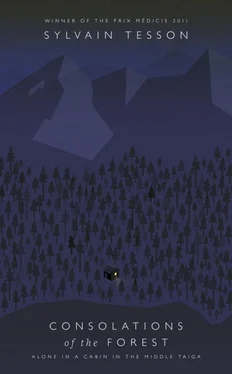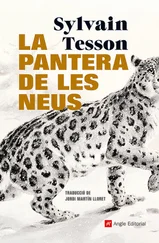Yesterday’s wind has polished the rink. I glide over the glaze with the grace of a seal. Internal faults sheet through the ice in turquoise veils. I pass refrozen fissures the colour of ivory. I maintain my balance, skating on the reflections of mountains that resemble shy dancers, cinched into their white dresses and hesitating to join the waltz.
Just before I catch a blade in a crack and crash onto the dance floor, I think about those athletic figure skaters in their tight spangled boleros who zip around whirling pink young Czech partners over their heads for a jury of old ladies who resemble escapees from a Riviera casino, busy brandishing little cards with numbers whose total will win the athlete either a kiss from the girl or chilly tears.
I hobble miserably home with bruised ankles.
In the evening, the sky clears and the temperature plummets. I spend a heavenly hour, swaddled in my bedding, on my wooden bench: a pine plank nailed to two stumps. I’m sitting at the edge of the forest, beneath the tree outside my southern window. Harassed by the western wind, the branches bend down towards the lake, forming a band shell. And in my alcove of icy needles providing an illusion of warmth, I gaze at the black well of the lake. I see the mass of ice as a nightmarish crucible. I sense the force at work beneath this lid. Down in this vault, a universe teems with creatures that slice, crush and devour. Sponges slowly wave their arms in the depths. Shells coil their spires, beating time to Time and creating nacreous jewels shaped like constellations. At the muddy bottom prowl silurids, monstrous catfish, while carnivorous fish migrate towards the surface in a nightly feast and holocaust of crustaceans. Shoals of Arctic char perform their benthic choreography. Bacteria churn and digest debris, purifying the lake. This bleak working of the waters takes place in silence, beneath a mirror where the stars haven’t even the strength to send down their reflections.
28 FEBRUARY
Force 8 this morning. The blasts carry off the snow, slamming it in angry clouds against the greenish-bronze wall where the cedar forest begins. Two hours of housekeeping. Cabin life fosters the same finickiness as does life on a small boat. Mustn’t end up like those sailors for whom being shipshape becomes an end in itself and who rot at permanent anchor in port, spending their days tidying an extinguished life.
Setting up residence in a one-room Siberian hut is a victory in the battle against being buried alive by objects. Life in the woods melts the fat away. Unburdened, the airship of life sails higher. Two thousand years ago, the Indo-Sarmatian steppe nomads knew enough to transport their possessions in a small wooden coffer. One’s attachment to belongings is in direct proportion to their rarity, and to a Siberian woodsman, a knife and a gun are as precious as any flesh-and-blood companion. An object that has been with us through the ups and downs of life takes on substance and a special aura; the years give it a protective patina. To learn to love each one of our poor patrimony of objects, we have to spend a long time with them. Soon the loving looks directed at the knife, the teapot and the lamp come to embrace their materials and elements: the wood of the spoon, the candle’s wax, the flame itself. As the nature of objects reveals itself, I seem to pierce the mysteries of their essence. I love you, bottle; I love you, little jackknife, and you, wooden pencil, and you, my cup, and you, teapot steaming away like a ship in distress. Outside roars such fury of wind and cold that if I don’t fill this cabin with love it might be blown apart.
I learn via my satellite phone, miraculously reactivated, that my sister’s child has been born. This evening I’ll drink to the baby’s health and pour a mug of vodka on this Earth that welcomes one more little creature foisted upon it without permission.
POEM: ON SNOW
For a domain, a bay;
For a castle, a cabin;
For a Fool, a tit;
For subjects, my memories.
Spent the morning cutting firewood. It’s stacked in a small but growing wall under the porch roof. I’ve got ten days’ worth of heating in those split logs.
A hermit expends intense physical energy. In life, we have the choice of putting machines to work or setting ourselves to the task. In the first instance, we entrust the satisfaction of our needs to technology. Relieved of all impetus towards effort, we devitalize ourselves. In the second case, we activate the machinery of our bodies to provide for all necessities. And the less we rely on machines, the more muscle we put on. Our bodies toughen up, our skin grows calloused and our faces weather. Energy redistributes itself, transferring from the belly of machines to the human body. Backwoodsmen are power stations glowing with dynamic force. When they enter a room, their vitality fills the space.
After a few days, I noticed the first changes in my body. My limbs are more muscular, but I’ve got the flabby abdomen and white skin of an alcoholic or a creature dwelling in a mud bank. Less tension, slower heartbeat: confined in a cramped space, I’m learning to move slowly. Even the mind grows lax. Without conversation, deprived of the contradiction and sarcasm of sparring partners, the hermit is less witty, less lively and incisive, less worldly, slower off the mark than a city dweller. The hermit gains in poetry what is lost in agility.
Sometimes, this desire to do nothing. I’ve been sitting at my table for an hour, surveying the progress of sunbeams across the tablecloth. Light ennobles all it touches even glancingly: wood, the row of books, the knife handles, the curve of a face and of time going by, even the dust motes in the air. That’s not nothing, to be specks of dust in this world.
So now I’m rhapsodizing about dust. March is going to be a long month.
1 MARCH
My father’s birthday. I imagine the dinner back home near Guise, in Picardy. Every year the family gathers in a restaurant remodelled from eighteenth-century stables: the Belgian cousins, beer, wine, meat and the light beaming down from the brick vaults. They must have arrived in the rain and are now dining cosily. The tables are set up beneath the racks where the animals once tucked into their feed. Hundreds of horses that would be warm in these stalls now spend the night outside in northern France. I’m no fonder of stables turned into banquet halls than I am of churches turned into munitions dumps. I pour myself a generous shot of vodka, raise a toast towards the west, and toss it down.
Would my father be happy here? He wouldn’t like all this nature. He loves the theatre, public debate, lively conversation. He is at home in the world of the snappy rejoinder. It’s hard to hold a conversation in the woods of Siberia. There’s nothing to stop a man from expressing himself, of course. He can always roar like the fellow in The Howling Miller , a tale by the Finnish novelist Arto Paasilinna. It’s just that yelling is futile. From a naturalist perspective, the rebellious figure of l’homme révolté is useless. The sole virtue, in these latitudes, is acceptance. Vide the Stoics, animals or (even better!) simple stones. The taiga can offer only two things: its resources, which we blithely plunder, and its indifference. Let’s take the moon, for example. Yesterday it was shining. In my notebook I wrote: The rhinoceros moon that with its horn wounds a night the colour of Africa . Just how much of a damn does the moon give about such sophomoric pseudo-aphorisms?
Tonight I finished a murder mystery. I closed the book feeling as if I’d just eaten at McDonald’s: nauseated and slightly ashamed. The action is hectic – and forgotten the next moment. Four hundred pages to find out whether MacDouglas cut up MacFarlane with a butter knife or an ice axe. The characters are ruled by all-powerful facts. The myriad details paper over a void. Is it because novels like these resemble bureaucratic bumf that they’re called police procedurals?
Читать дальше












